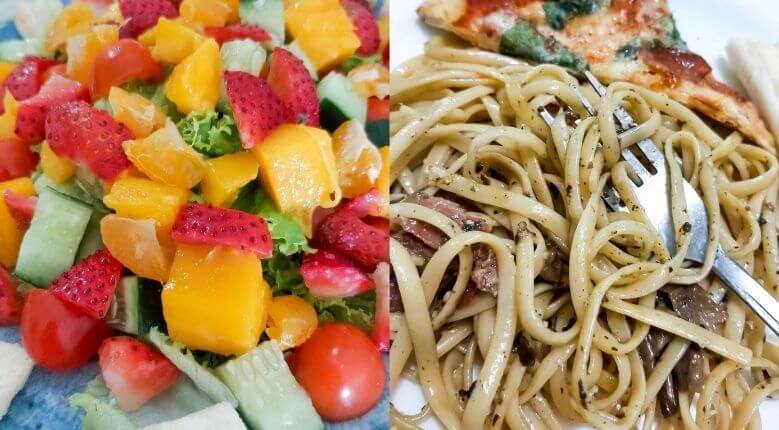Ever heard of intuitive eating? Going on a diet is usually the first to come to mind when we think of lifestyle changes. After all, eating is part of our daily routines and, unlike working out or starting a new hobby, turning to healthy eating should come naturally. However, in reality, it’s a lot harder to do. That’s where intuitive eating comes in.
As someone who's envied classmates and friends with flatter stomachs growing up, I’ve tried a variety of diets myself. One time, I only had bananas for breakfast for a week. In another instance, I tried the unhealthy ‘skipping out on meals’ method to see if it works. As expected, these only provided short term results.
Looking back at my old photos, I realised that I wasn’t exactly as ‘fat’ as I thought I was then. So what was I putting effort into and where did everything go wrong? Ahead, how I came into terms with my relationship with food through intuitive eating.

(Photo from: Sigmund via Unsplash)
But first, what is intuitive eating?
Intuitive eating is a “philosophy” that “makes you an expert of your body and its hunger signals,” according to Healthline. It was coined in 1995 by Evelyn Tribole and Elyse Resch who wrote a book bearing the same name. However, principles supporting intuitive eating was said to have existed as early as the 60s and aligned with the feminist movement at the time.
It’s not a fixed method or a specific lifestyle program you have to follow with bulleted steps, but rather a more instinctive and personal practice. At first, it seems kind of vague and confusing, considering that guidelines are meant to ‘force’ us into creating a new habit. But while I was studying how it works, I noticed how perfect it is for people who have very unpredictable lifestyles and eating habits as it is less restrained and more adaptive.
Its main idea focuses on two things: our physiological need to eat and how we eat based on our emotions. The first one is a given; the second one is usually the culprit when it comes to unhealthy eating.
Understanding the 10 basic principles of intuitive eating
Rejecting the diet mentality
As mentioned earlier, intuitive eating is all about being mindful of what you eat instead of restricting yourself to eat, which is what dieting is usually about. Knowing the difference between the two is key.
Honour your hunger
Our body needs fuel in order to function properly. However, because of many factors (busy schedule, irregular sleep patterns, etc.), we tend to neglect signs of hunger and push our eating schedule when it's convenient. Eating only when you've reached excessive hunger 'triggers a primal drive to overeat', which leads to being less mindful of what we put in our bodies. That's why eating when our body tells us to is important because it significantly helps our consumption control.
Make peace with food
As for ‘making peace with food,’ it’s letting go of all the notions about what you should and should not eat. Living with my family means eating whatever fits everyone’s palate and tastes, and that usually means unpredictable bouts of cravings or eating out from time to time. I mean, who can resist when you get offered home-baked cookies by your mum?
Challenge the food police
We all have voices in our heads that often make us feel guilty when we 'cheat' on our diets. The same voice is usually also one that tells us we need to reward ourselves with something indulgent if we did something good. Beating this voice is definitely challenging but it all goes back to building a healthy relationship with food and not treating it as a shackle or an escape whenever we do something good or bad.
Discover the satisfaction factor
Eating in a comfortable environment, matched with great company and food that we love is also essential in having a satisfying eating experience. It contributes a lot to how 'full' we feel beyond just the amount of food itself, preventing us from undereating and overeating.

Indulgent snacks are not the enemy. It’s all about eating in moderation.
Feel your fullness
In relation to the last point, trusting that you can control yourself around food that you like is also key to intuitive eating. Gauge what's a comfortable fullness level for you.
Cope with your emotions with kindness
Stress eating is often a quick escape whenever we're feeling anxious or tired. Finding a way to cope with your emotions without immediately turning to food at every sign of stress is important to make sure you balance mental and emotional health with physical health as well.
Respect your body
It's more than okay to have health goals or look up to health icons to motivate you to treat your body well. However, expecting your body to work like other people's is something to avoid. We all have a 'genetic blueprint' that determines how our body responds to certain situations and lifestyle changes. Finding out what works for you is a challenging experience, but once you do, it makes all the difference.
Movement — feel the difference
We often treat exercise as a means to lose weight or burn calories. However, instead of fixating on that, intuitive eating principles suggest that focusing more on how movement makes you feel will change your mindset when it comes to exercising. Getting fit has a lot of mental, emotional, and even social benefits that go beyond just moving down the scale.
Honour your health — gentle nutrition
Lastly, it's all about consistency. One dessert or slice of cake won't topple everything you've worked for.
Making the change
I’ve often been told that I’m a hearty eater who still knows to stop when full so I was quite surprised to learn how I’ve been intuitively eating even prior to this ‘experiment’. In fact, I'm surprised how many of these principles I already follow prior to this little exercise. However, when I read that honouring my hunger was also a principle of intuitive eating, that’s when I realised I was in trouble.
This has always been one of my biggest problems. I try to suppress my hunger and skip meals altogether when I’m caught up with work or something else that’s keeping me busy. I also can’t eat when I’ve let my hunger pass for too long as my body will start to feel horrible when I consume anything on an overly empty stomach.
As prompted by this series, I made sure I ate with a proper mealtime schedule (7AM for breakfast, 11AM/12NN for lunch, no later than 6PM for dinner) so I can assure my body wouldn’t reach a starving point. Whenever I feel like eating something just because I’m stressed or annoyed, I hold back from reaching for snacks and grab a glass of water instead.

Addressing the ‘right’ kind of hunger is key.
When I was itching to munch on something in between meals, I started to lean more towards fruits (or treats with fruits) to satiate my need for small bites. I don’t reject crisps or ice cream completely and happily indulge in them when I’m in the mood, but I realised that I started preferring fruits more when I made an active decision to incorporate them into my eating habits.
Through this entire process, I realised that mealtimes are there for a reason so you don’t push your body and hunger signals to a limit. Also holding back on junk snacks and trading them with a glass of water or a piece or fruit conditions the mind that it’s not hungry but rather just temporarily craving (like a need-versus-want kind of thing). This helps in controlling unhealthy intake of food without overly policing yourself about what you are and are not eating.
Should you try intuitive eating?
If I’m being honest, it’s both easy and hard to do. Easy because you might already be doing some of its practices without realising; hard because it requires self-reflection and policing and correcting eating habits you’ve previously developed. Still, it’s not impossible to get right. It only proves that, as cheesy as it sounds, the key to addressing your hunger to be healthy (pun obviously intended) is still ultimately up to you.
*The new normal calls for new routines. This story was previously part of a series where the TBL Bureau shared their journey of making healthier habits a new way of life.
Comments, questions or feedback? Email us at [email protected].



